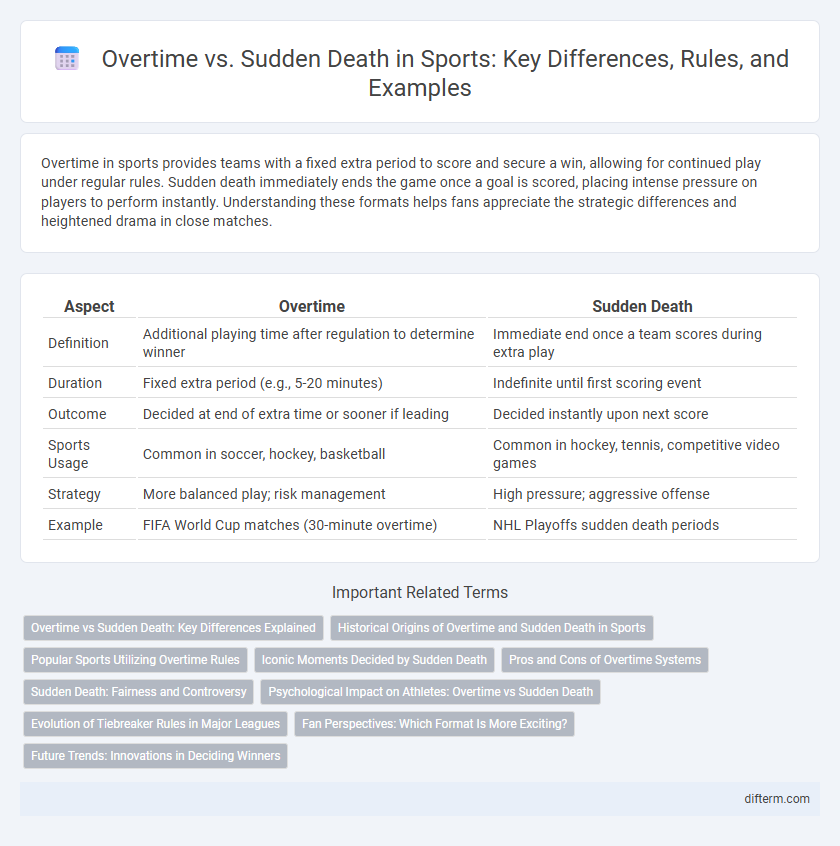Overtime in sports provides teams with a fixed extra period to score and secure a win, allowing for continued play under regular rules. Sudden death immediately ends the game once a goal is scored, placing intense pressure on players to perform instantly. Understanding these formats helps fans appreciate the strategic differences and heightened drama in close matches.
Table of Comparison
| Aspect | Overtime | Sudden Death |
|---|---|---|
| Definition | Additional playing time after regulation to determine winner | Immediate end once a team scores during extra play |
| Duration | Fixed extra period (e.g., 5-20 minutes) | Indefinite until first scoring event |
| Outcome | Decided at end of extra time or sooner if leading | Decided instantly upon next score |
| Sports Usage | Common in soccer, hockey, basketball | Common in hockey, tennis, competitive video games |
| Strategy | More balanced play; risk management | High pressure; aggressive offense |
| Example | FIFA World Cup matches (30-minute overtime) | NHL Playoffs sudden death periods |
Overtime vs Sudden Death: Key Differences Explained
Overtime in sports typically provides both teams a fixed period to score, ensuring equal opportunity to break a tie, while sudden death ends the game immediately when one team scores, creating a heightened sense of urgency. Overtime formats vary across leagues, ranging from timed extra periods in soccer and basketball to multiple additional innings in baseball. Sudden death is most common in sports like hockey and American football, where the first score during the overtime period decisively determines the winner, emphasizing instant resolution over extended play.
Historical Origins of Overtime and Sudden Death in Sports
Overtime first emerged in the late 19th century to resolve tied games, with early adaptations in soccer and American football to extend play beyond regulation. Sudden death was introduced in the mid-20th century as a decisive format, notably debuting in hockey's National Hockey League (NHL) in 1942 to determine a winner immediately upon a scoring play. These developments reflect evolving strategies to balance fairness, excitement, and scheduling constraints in competitive sports.
Popular Sports Utilizing Overtime Rules
Popular sports utilizing overtime rules include basketball, hockey, and American football, where extra periods allow teams to break ties by playing additional time. Overtime provides a structured opportunity to determine a winner through full or shortened extra periods, contrasting with sudden death formats that end immediately after a scoring play. The NBA and NHL typically use overtime periods with specific time limits, while sudden death remains common in college football and soccer shootouts for swift resolutions.
Iconic Moments Decided by Sudden Death
Sudden death overtime has produced some of the most iconic moments in sports history, where a single score instantly determines the winner. Legendary games such as the 1972 Summit Series hockey showdown and the 2019 NFL playoffs featured dramatic outcomes sealed by sudden death, highlighting its intense and unpredictable nature. These moments solidify sudden death as the ultimate test of skill and nerve under pressure.
Pros and Cons of Overtime Systems
Overtime systems in sports extend gameplay to allow fair resolution beyond regular time, providing teams equal opportunity to secure victory, which enhances competitive integrity and fan engagement. However, prolonged overtime can lead to player fatigue and increased injury risk, potentially affecting performance and health in subsequent games. Sudden death contrasts by delivering immediate results, but its high-stakes nature can lead to less strategic play and may not fully reflect team skill levels throughout the match.
Sudden Death: Fairness and Controversy
Sudden death in sports decisively ends the game once a team scores, creating intense pressure and swift resolution, but it faces criticism for potentially unfair outcomes where a single mistake can abruptly cost a team the match. Critics argue this format may not always reflect overall team performance or effort, as the outcome hinges on one critical play rather than cumulative skill or strategy. Despite controversy, sudden death remains popular in sports like ice hockey and soccer due to its dramatic conclusion and excitement for fans.
Psychological Impact on Athletes: Overtime vs Sudden Death
Overtime and sudden death formats create distinct psychological pressures on athletes, with overtime allowing for strategic pacing and mental adjustment, while sudden death triggers heightened stress due to the immediate, high-stakes nature of the outcome. Overtime can lead to fatigue-induced decision-making, impacting concentration and performance, whereas sudden death demands peak focus and resilience under intense anxiety. The psychological impact influences not only individual athletes' performance but also team dynamics and coping mechanisms during critical moments.
Evolution of Tiebreaker Rules in Major Leagues
Overtime and sudden death formats have significantly evolved across major sports leagues to balance fairness and excitement in tiebreaker situations. The NHL shifted from pure sudden death to a hybrid overtime with shootouts to reduce extended play, while the NFL introduced modified overtime rules that give both teams possession opportunities. Major League Baseball adopted extra innings with runner placement to speed up games, reflecting a broader trend toward optimizing game length without sacrificing decisive outcomes.
Fan Perspectives: Which Format Is More Exciting?
Fans often find sudden death more thrilling due to its high-stakes, immediate result nature that intensifies suspense in sports like hockey and soccer. Overtime, providing extended playtime, allows teams to strategize and showcase endurance, appealing to those who appreciate a more tactical contest. Viewer excitement ultimately depends on whether they favor the unpredictability of sudden death or the depth of competition overtime offers.
Future Trends: Innovations in Deciding Winners
Future trends in overtime formats emphasize the integration of advanced technology like AI-driven analytics and biometric data to ensure fairer, faster decisions. Innovations include hybrid models combining timed play with sudden death elements, enhancing excitement while reducing player fatigue. Emerging virtual and augmented reality tools also promise immersive fan experiences during decisive moments.
overtime vs sudden death Infographic

 difterm.com
difterm.com